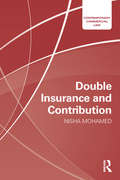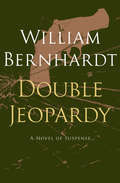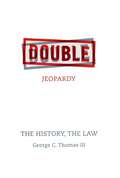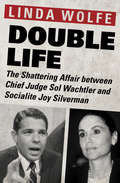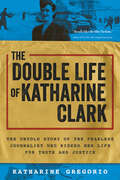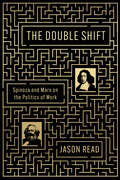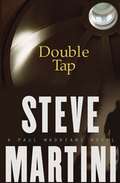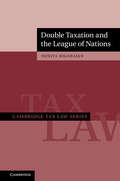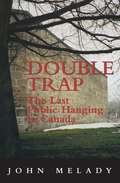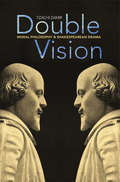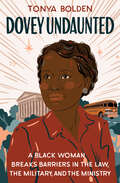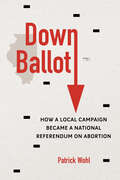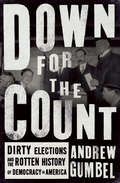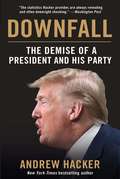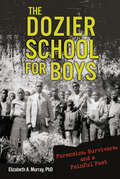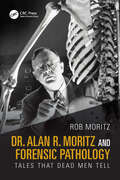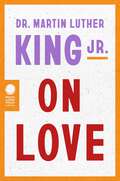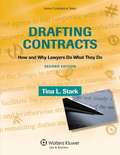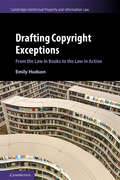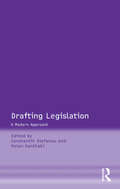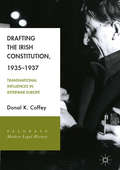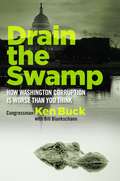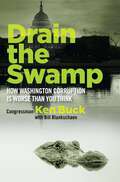- Table View
- List View
Double Insurance and Contribution (Contemporary Commercial Law)
by Nisha MohamedDouble insurance is an issue which frequently arises in practice. Dr Nisha Mohamed delves into the problems which arise in double insurance and the attempts to provide a solution to the uncertainty of the law in this area. The book begins with a fascinating look at the history and development of the law of double insurance, outlining how it has developed, and the factors the court may take into account when deciding cases involving double insurance. Attempting to provide a common law solution where no legislation has been enacted, the book covers contemporary instances of double insurance by focusing on: the relevant clauses (rateable proportion, excess, escape and other insurance) the difficulty of the courts in providing clear principles in cases of double insurance attempts to limit or exclude liability by the insurer how the clauses work in practice court decisions in various jurisdictions the Australian position under section 45 of the Insurance Contracts Act 1984 whether the Australian position can be adopted in the United Kingdom This text combines practical experience with academic rigour and will be of significant interest to lawyers, academics and insurance industry professionals alike.
Double Jeopardy: A Novel of Suspense
by William BernhardtHanded a rotten case, a lawyer will risk his life to uncover the truthA young woman is abducted by six men, beaten, raped, and left for dead. She can only identify one of her assailants: Al Moroconi, a tough guy whose links to the attack are only circumstantial. And when Moroconi&’s first lawyer is brutally murdered, the court appoints Travis Byrne, an ex-cop turned attorney, to defend him. In a lifetime of bad breaks, this will prove the worst piece of luck Byrne has ever had. Someone is trying to frame Moroconi, but why? Byrne is determined to answer this question, but doing so will see him threatened, beaten, and framed for murder. And as he attempts to clear his name, Byrne uncovers a sickening secret for which the original crime was only a cover-up. Only the truth can save him, but in a case like this, the truth could cost him his life.
Double Jeopardy: The History, The Law
by George C. Thomas, IIIIn the first book-length book on the subject in over a quarter century, George C. Thomas III advances an integrated theory of double jeopardy law, a theory anchored in historical, doctrinal, and philosophical method. Despite popular belief, double jeopardy has never been a limitation on the legislature. It functions instead to keep prosecutors and judges from imposing more than one criminal judgment for the same offense. Determining when seemingly different offenses constitute the "same offense" is no easy task. Nor is it always easy to determine when a defendant has suffered more than one criminal judgment. Tracing American double jeopardy doctrine back to twelfth century English law, the book develops a jurisprudential account of double jeopardy that recognizes the central role of the legislature in creating criminal law blameworthiness.
Double Life: The Shattering Affair between Chief Judge Sol Wachtler and Socialite Joy Silverman
by Linda WolfeA &“spellbinding&” account of the New York judge who was brought down by prescription drugs, sexual obsession, and a shocking criminal conviction (Ann Rule). He was the top justice of New York&’s highest court. She was a stunning socialite and his wife&’s step-cousin. In 1993 Sol Wachtler was convicted of blackmail and extortion against Joy Silverman, his former mistress. How did a respected jurist and one of the most prominent men in America end up serving time in prison? Linda Wolfe starts at the beginning—from Wachtler&’s modest Brooklyn upbringing through his courtship and marriage to Joan Wolosoff, the only child of a wealthy real estate developer. Joy Fererh was three and a half when her father walked out. When she and Sol met, he was fifty-five and nearing the pinnacle of his legal career. She was a thirtysomething stay-at-home mother who, with Sol&’s help, made a career for herself as a Republican Party fundraiser. They kept their affair a secret—until an explosive mix of sex, power, betrayal, and prescription-drug abuse set the stage for the tabloid headlines of the decade.
The Double Life of Katharine Clark: The Untold Story of the Fearless Journalist Who Risked Her Life for Truth and Justice
by Katharine Gregorio"Gregorio tells [Katharine] Clark's story in engaging, well-researched and vivid detail...an eloquent tribute." —Wall Street JournalIf you loved Kate Moore's The Radium Girls, Sonia Purnell's A Woman of No Importance, or Rebecca Donner's All the Frequent Troubles of Our Days, you'll be enthralled with this untold true story of how Katharine Clark, a trailblazing journalist, exposed the truth about Communism to the world.In 1955, Katharine Clark, the first American woman wire reporter behind the Iron Curtain, saw something none of her male colleagues did. What followed became one of the most unusual adventure stories of the Cold War. While on assignment in Belgrade, Yugoslavia, Clark befriended a man who, by many definitions, was her enemy. But she saw something in Milovan Djilas, a high-ranking Communist leader who dared to question the ideology he helped establish, that made her want to work with him. It became the assignment of her life.Against the backdrop of protests in Poland and a revolution in Hungary, she risked her life to ensure Djilas's work made it past the watchful eye of the Yugoslavian secret police to the West. She single-handedly was responsible for smuggling his scathing anti-Communism manifesto, The New Class, out of Yugoslavia and into the hands of American publishers. The New Class would go on to sell three million copies worldwide, become a New York Times bestseller, be translated into over 60 languages, and be used by the CIA in its covert book program.Meticulously researched and written by Clark's great-niece, Katharine Gregorio, The Double Life of Katharine Clark illuminates a largely untold chapter of the twentieth century. It shows how a strong-willed, fiercely independent woman with an ardent commitment to truth, justice and freedom put her life on the line to share ideas with the world, ultimately transforming both herself—and history—in the process.Praise for The Double Life of Katharine Clark:"Reads like thriller fiction."—Major General Mari K. Eder, author of The Girls Who Stepped Out of Line"[A] nail-biting story…recreates a forgotten chapter of the Cold War."—Robert D. Kaplan, national bestselling author of Balkan Ghosts"An interesting read well told."—Nina Willner, author of Forty Autumns"[A] fascinating book about an extraordinary woman who made her mark during the Cold War."—Dr. Aleksa Djilas, author of The Contested Country and the son of Steffie and Milovan Djilas
Double Paradox
by Andrew WedemanAccording to conventional wisdom, rising corruption reduces economic growth. And yet, between 1978 and 2010, even as officials were looting state coffers, extorting bribes, raking in kickbacks, and scraping off rents at unprecedented rates, the Chinese economy grew at an average annual rate of 9 percent. In Double Paradox, Andrew Wedeman seeks to explain why the Chinese economy performed so well despite widespread corruption at almost kleptocratic levels. Wedeman finds that the Chinese economy was able to survive predatory corruption because corruption did not explode until after economic reforms had unleashed dynamic growth. To a considerable extent corruption was also a by-product of the transfer of undervalued assets from the state to the emerging private and corporate sectors and a scramble to capture the windfall profits created by their transfer. Perhaps most critically, an anti-corruption campaign, however flawed, has proved sufficient to prevent corruption from spiraling out of control. Drawing on more than three decades of data from China-as well as examples of the interplay between corruption and growth in South Korea, Taiwan, Equatorial Guinea, and other nations in Africa and the Caribbean-Wedeman cautions that rapid growth requires not only ongoing and improved anti-corruption efforts but also consolidated and strengthened property rights.
The Double Shift: Spinoza and Marx on the Politics of Work
by Jason Read"This book is a must read for students of contemporary capitalism."—Kathi Weeks, Duke University"Why do people fight for their exploitation as if it was liberation?" How Marx and Spinoza can explain our perverse attachment to the indignities of workIn a world of declining wages, working conditions, and instability, the response for many has been to work harder, increasing hours and finding various ways to hustle in a gig economy. What drives our attachment to work? To paraphrase a question from Spinoza, "Why do people fight for their exploitation as if it was liberation?"The Double Shift turns towards the intersection of Marx and Spinoza in order to examine the nature of our affective, ideological, and strategic attachment to work. Through an examination of contemporary capitalism and popular culture it argues that the current moment can be defined as one of "negative solidarity."The hardship and difficulty of work is seen not as the basis for alienation and calls for its transformation but rather an identification with the difficulties and hardships of work. This distortion of the work ethic leads to a celebration of capitalists as job creators and suspicion towards anyone who is not seen as a "real worker."The book is grounded in philosophy, specifically Marx and Spinoza, and is in dialogue with Plato, Smith, Hegel, and Arendt, but, at the same time, in examining contemporary ideologies and ideas about work it discusses motivational meetings at Apple Stores, the culture of Silicon Valley, and films and television from Office Space to Better Call SaulThe Double Shift argues for a transformation of our collective imagination and attachment to work.
Double Tap
by Steve Martinithe latest book in Martini's Paul Madriani series. Madriani defends an ex-soldier accused of killing the head of a computer security firm. the method of execution -- a double tap -- points to a man with military experience. complicating Madriani's case is the unwillingness of the defendant to talk about his military past.
Double Taxation and the League of Nations (Cambridge Tax Law Series)
by Sunita JogarajanModern-day tax treaties have their foundations in one of the three Model Tax Treaties developed by the League of Nations in 1928. <P><P>Using previously unexplored archival material, Sunita Jogarajan provides the first in-depth examination of the development of the League's Models. This new research provides insights into questions such as the importance of double taxation versus tax evasion; the preference for source-taxation versus residence-taxation; the influence of theory and practice on the League's work; the development of bilateral rather than multilateral treaties; the influence of developing countries on the League's work; the role of Commentary in interpreting model tax treaties; and the influential factors and key individuals involved. A better understanding of the development of the original models will inform and help guide interpretation and reform of modern-day tax treaties. Additionally, this book will be of interest to scholars of international relations and the development of law at international organisations.<P> Fills a gap in the literature on double taxation.<P> The first study of the archival evidence on the establishment of the first model tax treaties dealing with double taxation.<P> Highlights relevant aspects of later tax treaty developments and the current OECD Model.
Double Trap: The Last Public Hanging in Canada
by John MeladyA dozen years before the Black Donnellys were butchered at Lucan, Ontario, another murderous rampage took place a few miles away. On June 6, 1868, three men robbed and killed a rich farmer, his wife, and her unborn child. They concocted an alibi, stuck to it, and almost got off. In fact, two of them did.The third, Nicholas Melady, went to prison and fell in love with a beautiful woman in a nearby cell. There to entrap him, she listened, learned, and led him to the gallows. When he was hanged in Goderich, hundreds watched, but thousands were late for the spectacle. They were bitterly disappointed because they had missed the last public hanging in Canada.
Double Vision: Moral Philosophy and Shakespearean Drama
by Tzachi ZamirHamlet tells Horatio that there are more things in heaven and earth than are dreamt of in his philosophy. In Double Vision, philosopher and literary critic Tzachi Zamir argues that there are more things in Hamlet than are dreamt of--or at least conceded--by most philosophers. Making an original and persuasive case for the philosophical value of literature, Zamir suggests that certain important philosophical insights can be gained only through literature. But such insights cannot be reached if literature is deployed merely as an aesthetic sugaring of a conceptual pill. Philosophical knowledge is not opposed to, but is consonant with, the literariness of literature. By focusing on the experience of reading literature as literature and not philosophy, Zamir sets a theoretical framework for a philosophically oriented literary criticism that will appeal both to philosophers and literary critics. Double Vision is concerned with the philosophical understanding induced by the aesthetic experience of literature. Literary works can function as credible philosophical arguments--not ones in which claims are conclusively demonstrated, but in which claims are made plausible. Such claims, Zamir argues, are embedded within an experiential structure that is itself a crucial dimension of knowing. Developing an account of literature's relation to knowledge, morality, and rhetoric, and advancing philosophical-literary readings of Richard III, Macbeth, Romeo and Juliet, Othello, Antony and Cleopatra, Hamlet, and King Lear, Zamir shows how his approach can open up familiar texts in surprising and rewarding ways.
Doubt in Islamic Law
by Intisar A. RabbThis book considers an important and largely neglected area of Islamic law by exploring how medieval Muslim jurists resolved criminal cases that could not be proven beyond a doubt. Intisar A. Rabb calls into question a controversial popular notion about Islamic law today, which is that Islamic law is a divine legal tradition that has little room for discretion or doubt, particularly in Islamic criminal law. Despite its contemporary popularity, that notion turns out to have been far outside the mainstream of Islamic law for most of its history. Instead of rejecting doubt, medieval Muslim scholars largely embraced it. In fact, they used doubt to enlarge their own power and to construct Islamic criminal law itself. Through a close examination of legal, historical, and theological sources, and a range of illustrative case studies, this book shows that Muslim jurists developed a highly sophisticated and regulated system for dealing with Islam's unique concept of doubt, which evolved from the seventh to the sixteenth century.
Dovey Undaunted: A Black Woman Breaks Barriers in the Law, the Military, and the Ministry
by Tonya BoldenCoretta Scott King Honor–winning author Tonya Bolden chronicles the life of an intrepid lawyer and civil rights pioneer. Dovey Johnson Roundtree was most famous for her successful defense of an indigent Black man accused of the murder of Mary Pinchot Meyer, a prominent white Washington, DC, socialite, in 1965. Despite her triumph in this high-profile case, Roundtree continued to represent the poor and the underserved. She was the first lawyer to bring a bus desegregation case before the Interstate Commerce Commission, clinching the ruling that enabled Robert F. Kennedy to enforce bus integration. She was also among the first Black women to enter the Women’s Army Auxiliary Corps, and was one of the first ordained female ministers in the African Methodist Episcopal Church. Tracing Roundtree’s life from her childhood in Jim Crow North Carolina through her adulthood, Tonya Bolden illuminates a little-known figure in American history who believed the law should serve the people, and places her firmly in the context of twentieth-century civil rights and African American culture.
Down Ballot: How a Local Campaign Became a National Referendum on Abortion
by Patrick WohlWhen an obscure primary election met the culture wars In 1990, a suburban Chicago race for the Republican Party nomination for state representative unexpectedly became a national proxy battle over abortion in the United States. But the hard-fought primary also illustrated the overlooked importance of down-ballot contests in America’s culture wars. Patrick Wohl offers the dramatic account of a rollercoaster campaign that, after attracting political celebrities and a media circus, came down to thirty-one votes, a coin toss to determine the winner, and a recount fight that set a precedent for how to count dimpled chads. As the story unfolds, Wohl provides a rare nuts-and-bolts look at an election for state office from its first days through the Illinois Supreme Court decision that decided the winner--and set the stage for a decisive 1992 rematch. A compelling political page-turner, Down Ballot takes readers behind the scenes of a legendary Illinois election.
Down for the Count: Dirty Elections and the Rotten History of Democracy in America
by Andrew GumbelThe updated edition of Steal This Vote—a rollicking history of US voter suppression and fraud from Jacksonian democracy to Citizens United and beyond. In Down for the Count, award-winning journalist Andrew Gumbel explores the tawdry history of elections in the United States. From Jim Crow to Tammany Hall to the Bush v. Gore Florida recount, it is a chronicle of votes bought, stolen, suppressed, lost, miscounted, thrown into rivers, and litigated up to the Supreme Court. Gumbel then uses this history to explain why America is now experiencing the biggest backslide in voting rights in more than a century. First published in 2005 as Steal This Vote, this thoroughly revised and updated edition reveals why America faces so much trouble running clean, transparent elections. And it demonstrates how the partisan battles now raging over voter IDs, campaign spending, and minority voting rights fit into a long, largely unspoken tradition of hostility to the very notion of representative democracy. Interviewing Democrats, Republicans, and a range of voting rights activists, Gumbel offers an engaging and accessible analysis of how our democratic integrity is so often corrupted by racism, money, and power. In an age of high-stakes electoral combat, billionaire-backed candidacies, and bottom-of-the-barrel campaigning, this book is more important than ever. &“In a riveting and frightening account, Gumbel . . . traces election fraud in America from the 18th century to the present . . . [the issues he] so winningly addresses are crucial to the future of democracy.&” —Publishers Weekly, on Steal This Vote
Downfall: The Demise of a President and His Party
by Andrew HackerTake a tour through the elections since 2016 and the Republican Party&’s strongest stances to understand the impending defeat of Donald Trump in the 2020 Presidential election. Downfall does not offer a prediction or wishful thinking—it affirms a certainty. Veteran political scientist Andrew Hacker&’s vast array of evidence points to the conclusion that Donald Trump will not be reelected, regardless of which Democratic candidate opposes him. Based on a close analysis of midterm and special elections, Hacker has found that Trump&’s so-called base is shrinking and that a strong majority of voting Americans want Trump out of office. Alongside comments from Republican Party members on why they stand with their party, Hacker autopsies their most steadfast viewpoints to illustrate from where these opinions stem and why Trump supporters provide him with votes. This includes an examination of Republican positions on: Gun controlAbortion and women&’s rightsSexism and gender disparitiesRacism and affirmative actionLGBTQ rightsClimate Change And more Both a look back at the years since Trump&’s election and a glimpse into what lies ahead for politics, Downfall provides an optimistic outlook that the most divisive leader in the US&’s history will join the ranks of one-term presidents.
The Dozier School for Boys: Forensics, Survivors, and a Painful Past
by Elizabeth A. MurraySome true crimes reveal themselves in bits and pieces over time. One such case is the Florida School for Boys, a.k.a. the Dozier School, a place where—rather than reforming the children in their care—school officials tortured, raped, and killed them. Opened in 1900, the school closed in 2011 after a Department of Justice investigation substantiated allegations of routine beatings and killings made by about 100 survivors. Thus far, forensic anthropologist Dr. Erin Kimmerle and her team from the University of South Florida have uncovered fifty-five sets of human remains. Follow this story of institutional abuse, the brave survivors who spoke their truth, and the scientists and others who brought it to light.
Dr. Alan R. Moritz and Forensic Pathology: Tales That Dead Men Tell
by Rob MoritzForensic science has become a mainstay of popular culture on television, in movies, books, and podcasts. Dr. Alan R. Moritz (1899-1986) was a highly influential figure in the development of the field of forensic science as we know it today.Dr. Alan R. Moritz and Forensic Pathology: Tales that Dead Men Tell, written by Dr. Moritz’s journalist grandson Rob Moritz, recounts his life and career from personal papers and correspondence, interviews, newspaper accounts and other sources, including archived materials from Harvard Medical School, the Rockefeller Foundation, Case Western Reserve University and the University Hospitals of Cleveland. Chapters chronicle more than a half-century of ground-breaking research and high-profile investigations, including some of the 20th century’s most infamous cases. This includes the assassination of President John F. Kennedy, the Sam Shepherd case, the Cocoanut Grove nightclub fire, the Attica prison riots and the Texas Tower sniper, as well as his contributions to the well-known Nutshell Studies of Unexplained Death. Dr. Moritz, the inspiration for the first on-screen forensic scientist, is credited with being one of the most prominent pioneers of the last century, helping to move forensic medicine from the political jurisdiction of untrained local coroners to a respected scientific discipline that fascinates the public.The book also details Dr. Moritz’s travels, during which he experienced some of society’s darkest chapters. This includes an infamous lynching during the “Red Summer” of 1919, the rise of Nazi Germany and the degradation of apartheid in South Africa, all of which influenced and shaped his worldview. Highlights of Dr. Moritz’s work, recounted in detail, include career stops at Case Western Reserve University in Cleveland and Harvard Medical School in Boston. Coverage details his most salient and well-known research—as well as insightful anecdotes and stories that demonstrate Dr. Moritz’s character and the development and evolution of his scientific views over the years.This book: Profiles the life of a well-known and impactful figure in the advancement of forensic pathology’s public perception and practices in the United States. Provides background on Dr. Moritz’s seminal work, the article Classical Mistakes in Forensic Pathology Is of interest to medical practitioners, history of science buffs, and forensic practitioners interested in the early history and development of forensic pathology as a discipline Dr. Alan R. Moritz and Forensic Pathology fills in a missing chapter on the life, research, and lasting legacy of Dr. Moritz, providing insight into the development of modern forensic pathology practice by examining the momentous contributions and character of one of its true pioneers.
Dr. Martin Luther King Jr. on Love
by Dr. Martin Luther King Jr.A remarkable compilation of Dr. Martin Luther King Jr.’s reflections on love and its transformative power—a stellar addition to Dr. King’s archives published exclusively by HarperCollins.“I have also decided to stick with love for I know that love is ultimately the only answer to mankind’s problems.”—Martin Luther King Jr.Dr. King, one of the greatest civil rights leaders in history, wrote and reflected frequently about love. He understood its transformative power and the essential role love played in his mission as the catalyst for positive change.Now for the first time, in this project of the Dr. King archives published exclusively by HarperCollins, readers will get access to many of King’s writings on love—compiled in a deeply insightful, moving and transformative work of literature. Each section of the book is accompanied by brief introductory editorial remarks that reflect on the historical context of each speech, sermon, and piece of writing, and will further enrich the reader's understanding and appreciation of Dr. King's timeless wisdom.Love is explored, championed, and debated around the world. It is the central concern of many religious practices. Readers are deeply curious about its nature. C.S. Lewis' The Four Loves, Thich Nhat Hanh's How To Love, or even bell hooks' All About Love showcase that readers and writers share this universal longing and fascination to uncover love’s mysteries.This book represents the first volume in an "On" series from the MLK archives, featuring MLK on various subjects. By grouping his work by subject, readers will get a glimpse at the evolution of his ideas and understand the circumstances in which that theme emerged to lead his concerns.
Drafting Contracts (Second Edition): How And Why Lawyers Do What They Do
by Tina L. StarkAn eagerly anticipated second edition of this established and highly regarded text teaches the key practice skill of contract drafting, with emphasis on how to incorporate the business deal into the contract and add value to the client's deal.
Drafting Copyright Exceptions: From the Law in Books to the Law in Action (Cambridge Intellectual Property and Information Law #51)
by Emily HudsonHow should copyright exceptions be drafted? This is a question of ongoing concern in scholarly and law reform debates. In Drafting Copyright Exceptions, Emily Hudson assesses drafting options using insights from the standards and rules literature, and case studies from cultural institutions in Australia, Canada, the UK and the US. Drawing on thousands of hours of interviews conducted over fourteen years, the book describes how staff engage with and interpret the law. Whilst some practices are guided strongly by copyright doctrine, others are influenced by the factors such as ethical views, risk assessment, and prosaic matters related to collection management. This work should be read by anyone interested in a detailed account of interpretative practices related to the drafting of copyright exceptions, but it also speaks to broader debates about the relationship between the 'law in books' and the 'law in action'.
Drafting Legislation: A Modern Approach
by Helen Xanthaki Constantin StefanouDrafting Legislation sets out to prove Sir William Dale's doctrine that the rules for drafting good quality legislation are the same in common and civil systems of law. Legislative solutions can therefore serve the drafter, the judge and the practitioner of any jurisdiction. The book discusses the general issue of quality in legislation from the legislative process to the actual drafting interpretation and enforcement. It also analyzes topics related to quality in legislation such as clarity, precision and disambiguity, plain language and gender-neutral language and assesses whether Sir William's view of universality in the definition and elements of quality in legislation is right or not. The volume is of critical interest to students and scholars of European law and the philosophy and theory of law.
Drafting the Irish Constitution, 1935–1937: Transnational Influences In Interwar Europe (Palgrave Modern Legal History Ser.)
by Donal K. CoffeyThe second of two volumes, this book situates the drafting of the Irish Constitution within broader transnational constitutional currents. Donal K. Coffey pioneers a new method of draft sequencing in order to track early influences in the drafting process and demonstrate the importance of European influences such as the German, Polish, and Portuguese Constitutions to the Irish drafts. He also analyses the role that religion played in the drafting process, and considers the new institutions of state, such as the presidency and the senate, tracing the genesis of these institutions to other continental constitutions. Together with volume I, Constitutionalism in Ireland, 1932–1938, this book argues that the 1937 Constitution is only explicable within the context of the European and international trends which inspired it.
Drain the Swamp: How Washington Corruption is Worse than You Think
by Ken BuckDrain the Swamp! Lavish parties. Committee chairmanships for sale. Pay-to-play corruption. Backroom arm-twisting. Votes on major legislation going to the highest bidder. Congressman Ken Buck blows the whistle on the real-life House of Cards that is our nation's capital. Elected in 2014 in one of the largest Republican freshman classes ever, Buck quickly discovered why nothing gets done in Congress—and it isn't because of political gridlock. In fact, Republicans and Democrats work together all too well to fleece taxpayers and plunge America deeper into debt. Buck has witnessed first-hand how the unwritten rules of Congress prioritize short-term political gain over principled leadership. When he tangled with Washington power brokers like former Speaker John Boehner, he faced petty retaliation. When he insisted Republicans keep their word to voters, he was berated on the House floor by his own party's leaders. When other members of Congress dared to do what they believed to be right for America instead of what the party bosses commanded, Buck saw them stripped of committee positions and even had to defend his position as freshman class president. In Drain the Swamp, you'll learn: * What really goes on behind congressional closed doors—and Buck names names * How committee chairmanships are bought * Why one-third of the discretionary spending in the federal budget is actually illegal—and could be cut immediately * The constitutional remedy just waiting to be used that could drain the swamp of Washington corruption faster than anything else * BONUS: Why you're not powerless— what you, the American voter, can do to make your voice heard Shocking in its revelations, but practical in its plans for reform, Ken Buck's book Drain the Swamp is the one book you need to understand how President Trump's campaign slogan could become a reality.
Drain the Swamp: How Washington Corruption is Worse than You Think
by Ken BuckLavish parties. Committee chairmanships for sale. Pay-to-play corruption. Backroom arm-twisting. Votes on major legislation going to the highest bidder. Welcome to Washington, D.C., the swamp that President Donald Trump was elected to drain.Congressman Ken Buck is blowing the whistle on the real-life House of Cards in our nation's capital. Elected in 2014 as president of one of the largest Republican freshman classes ever to enter Congress, Buck immediately realized why nothing gets done in Congress, and it isn't because of political gridlock—in fact, Republicans and Democrats work together all too well to fleece taxpayers and plunge America deeper into debt."It is an insular process directed by power-hungry party elites who live like kings and govern like bullies," Buck reports.Buck has witnessed first-hand how the unwritten rules of Congress continually prioritize short-term political gain over lasting, principled leadership. When Buck tangled with Washington power brokers like former Speaker John Boehner, he faced petty retaliation. When he insisted Republicans keep their word to voters, he was berated on the House floor by his own party leaders. When other members of Congress dared to do what they believed to be right for America instead of what the party bosses commanded, Buck saw them stripped of committee positions and even denied dining room privileges by the petty beltway bullies.In Drain the Swamp, Buck names names and tells incredible true stories about what really happened behind closed doors in Congress during legislative battles that have ensued over the last two years including budget, continuing resolutions, omnibus, trade promotion authority, Iran, and more. If the Trump administration is going to bring real change to Washington, it first needs to get the whole story—from deep inside the swamp.
